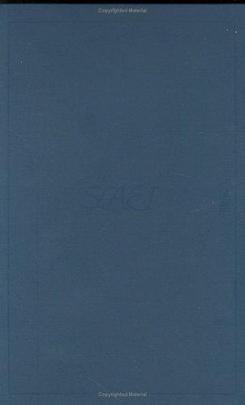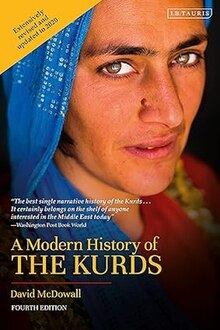
The Democratic Party of Iranian Kurdistan, also known as the Kurdish Democratic Party of Iran (KDPI), is an armed leftist ethnic party of Kurds in Iran, exiled in northern Iraq. It is banned in Iran and thus not able to operate openly. The group calls for self-determination of Kurdish people, and has been described as seeking either separatism or autonomy within a federal system.
Michael M. Gunter is a professor of political science at Tennessee Technological University in Cookeville, Tennessee and considered an authority on the Kurds in Turkey, Iraq, Syria, and Iran. Brendan O’Leary referred to Gunter as, "The doyen of Kurdish political studies in the United States,” while Martin van Bruinessen wrote that Gunter is "probably the most prolific of today’s scholars of Kurdish politics.” Gunter has written or edited more than 15 books on the Kurdish struggle and 2 more criticized for promoting Armenian genocide denial. Two of those books on the Kurds were among the first analyses in English in modern times of the Kurdish unrest in the Middle East. In writing his analyses, Gunter has worked directly with top Kurdish and other Middle Eastern political leaders. He received the Kurdish Human Rights Watch's “Service to the Kurds Award” in 1998. "Gunter’s analyses and writings sometimes strike readers as controversial, but he says his views are often based on information that hasn't yet been made public." He has served as the secretary-general of the EU Turkey Civic Commission (EUTCC), an NGO in Brussels that lobbies the EU parliament on behalf of the Kurds since 2009. He is a member of the Board of Advisory Editors of The Middle East Journal, The Journal of South Asian and Middle Eastern Studies, and The International Journal of Turkish Studies, among others.
Kurds in Iran constitute a large minority in the country with a population of around 9 and 10 million people.

Kurdish culture is a group of distinctive cultural traits practiced by Kurdish people. The Kurdish culture is a legacy from ancient peoples who shaped modern Kurds and their society.

Turkish Kurdistan or Northern Kurdistan is the southeastern part of Turkey where Kurds form the predominant ethnic group. The Kurdish Institute of Paris estimates that there are 20 million Kurds living in Turkey, the majority of them in the southeast.

Narratives of Islamic Origins: The Beginnings of Islamic Historical Writing is a 1998 book by historiographer of early Islam Fred Donner. The work was first published in January 1998 through Darwin Press as the fourteenth volume in the Studies in Late Antiquity and Early Islam series and has since gone through three editions.

The Dersim rebellion was a Kurdish uprising against the central government in the Dersim region of eastern Turkey, which includes parts of Tunceli Province, Elazığ Province, and Bingöl Province. The rebellion was led by Seyid Riza, a chieftain of the Abasan tribe. In 1937 and 1938, the Turkish Armed Forces carried out three Dersim operations against the rebellion, including the Dersim massacre, of civilians: thousands of Kurds were killed and many others were internally displaced.

Kurds in the United States refers to people born in or residing in the United States of Kurdish origin or those considered to be ethnic Kurds.

Ervand Abrahamian is an Iranian-American historian of the Middle East. He is Distinguished Professor of History at Baruch College and the Graduate Center of the City University of New York and is widely regarded as one of the leading historians of modern Iran.
People's Democracy Party was a Kurdish political party in Turkey. Murat Bozlak founded the party on 11 May 1994. The party disbanded in 2003.

The 1983–1986 Kurdish rebellions in Iraq occurred during the Iran–Iraq War as PUK and KDP Kurdish militias of Iraqi Kurdistan rebelled against Saddam Hussein as part of the Iraqi–Kurdish conflict, in an attempt to form an independent state. With Iraqi government forces occupied by the Iran-Iraq War, Kurdish Peshmerga succeeded in taking control of some enclaves, with Iranian logistic and sometimes military support. The initial rebellion resulted in stalemate by 1985.

Sheikh Ubeydullah also known as Sayyid Ubeydullah, was the leader of the first modern Kurdish nationalist struggle. Ubeydullah demanded recognition from Ottoman Empire and Qajar dynasty authorities for an independent Kurdish state, or Kurdistan, which he would govern without interference from Ottoman or Qajar authorities.

The Republic of Mahabad, also referred to as the Republic of Kurdistan, was a short-lived Kurdish self-governing unrecognized state in present-day Iran, from 22 January to 15 December 1946. The Republic of Mahabad, a puppet state of the Soviet Union, arose alongside the Azerbaijan People's Government, a similarly short-lived unrecognized Soviet puppet state.

Mahmud Barzanji revolts were a series of armed uprisings by Kurdish Sheykh Mahmud Barzanji against the Iraqi authority in newly conquered British Mesopotamia and later the British Mandate in Iraq. Following his first insurrection in May 1919, Sheykh Mahmud was imprisoned and eventually exiled to India for a one-year period. When returning, he was once again appointed a governor, but shortly revolted again declaring himself as the ruler of the Kingdom of Kurdistan. The Kingdom of Kurdistan lasted from September 1922 – July 1924. With British forces greatly exceeding his in ammunition and training, the defeat finally subdued the region to central British Iraqi rule in 1924. Sheykh Mahmud retreated into mountains, and eventually reached terms with the independent Kingdom of Iraq in 1932, over his return from the underground. Sheykh Mahmud revolts are considered the first chapter of the modern Iraqi–Kurdish conflict.

Syrian Kurdistan is a region in northern Syria where Kurds form the majority. It is surrounding three noncontiguous enclaves along the Turkish and Iraqi borders: Afrin in the northwest, Kobani in the north, and Jazira in the northeast. Syrian Kurdistan is often called Western Kurdistan or Rojava, one of the four "Lesser Kurdistans" that comprise "Greater Kurdistan", alongside Iranian Kurdistan, Turkish Kurdistan, and Iraqi Kurdistan.
Iranian Kurdistan or Eastern Kurdistan is an unofficial name for the parts of northwestern Iran with either a majority or sizable population of Kurds. Geographically, it includes the West Azerbaijan Province, Kurdistan Province, Kermanshah Province, Ilam Province and parts of Hamadan Province and Lorestan Province.
The denial of Kurds was the official state policy of Turkey for several decades, which denied that Kurds constitute its own ethnic group and instead alleged that they are a subgroup of Turks, and the words 'Kurd' and 'Kurdistan' were omitted by state institutions. During the 20th century, Kurds were referred to as Mountain Turks, with the state prohibiting the use of the terms "Kurd" or "Kurdish". As of the 2020s, Turkey does not recognize Kurds as an ethnic group nor Kurdish as a language.
Fatma Müge Göçek is a Turkish sociologist and professor at the University of Michigan. She wrote the book Denial of Violence in 2015 concerning the prosectution of Armenians in the Ottoman Empire and Turkey, for which she received the Mary Douglas award for best book from the American Sociological Association. In 2017, she won a Distinguished Faculty Achievement Award from the university.
History and the Culture of Nationalism in Algeria is a book by James McDougall published originally by Cambridge University Press in 2006. It is part of the Cambridge Middle East Studies Series. The book is an analysis of how the Algerian nationalist narrative was created and developed in popular memory. The author pays particular attention to the role the Association of Muslim Scholars and Ahmad Tawfiq al-Madani played in the development of the nationalist narrative.











